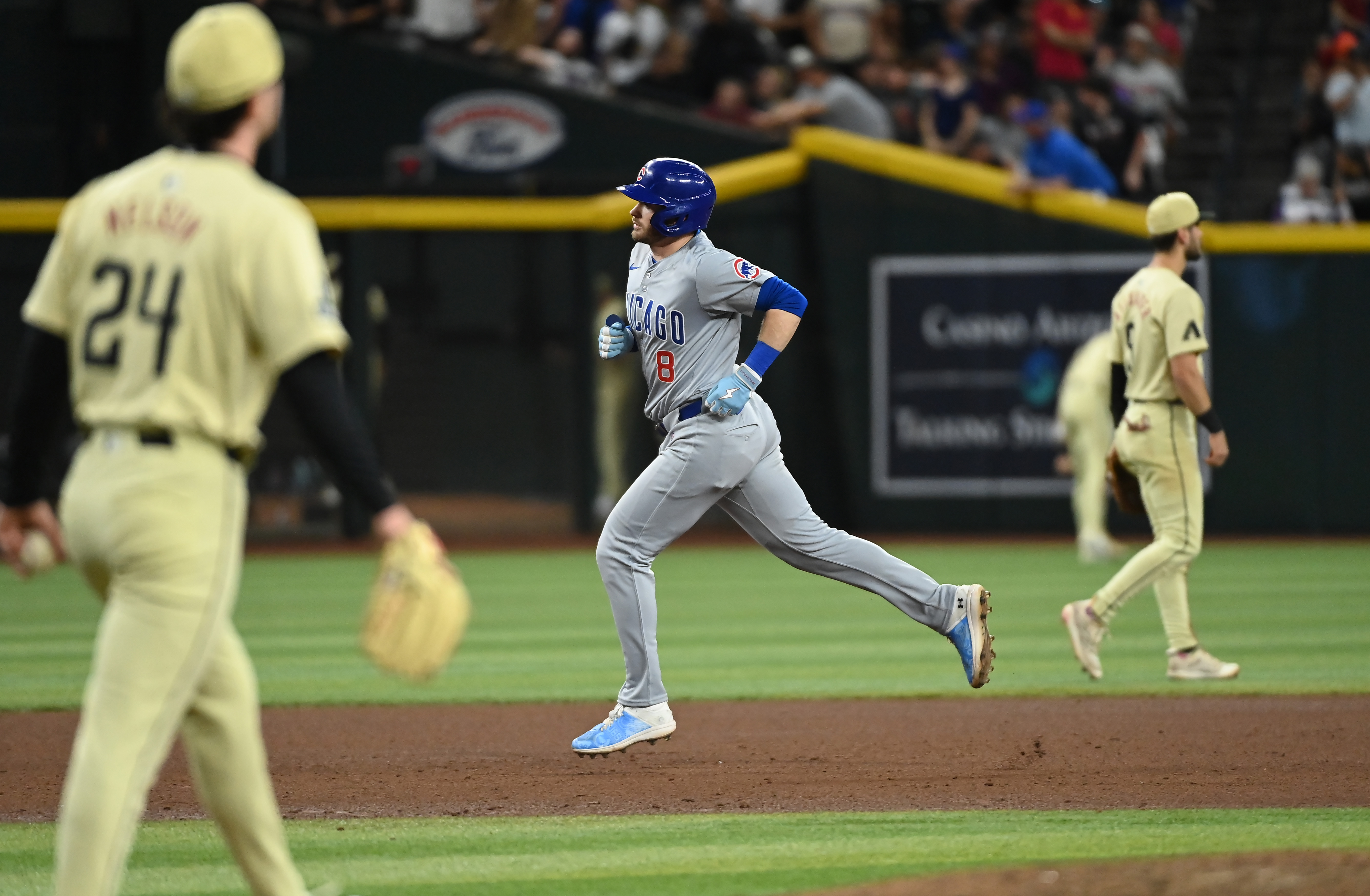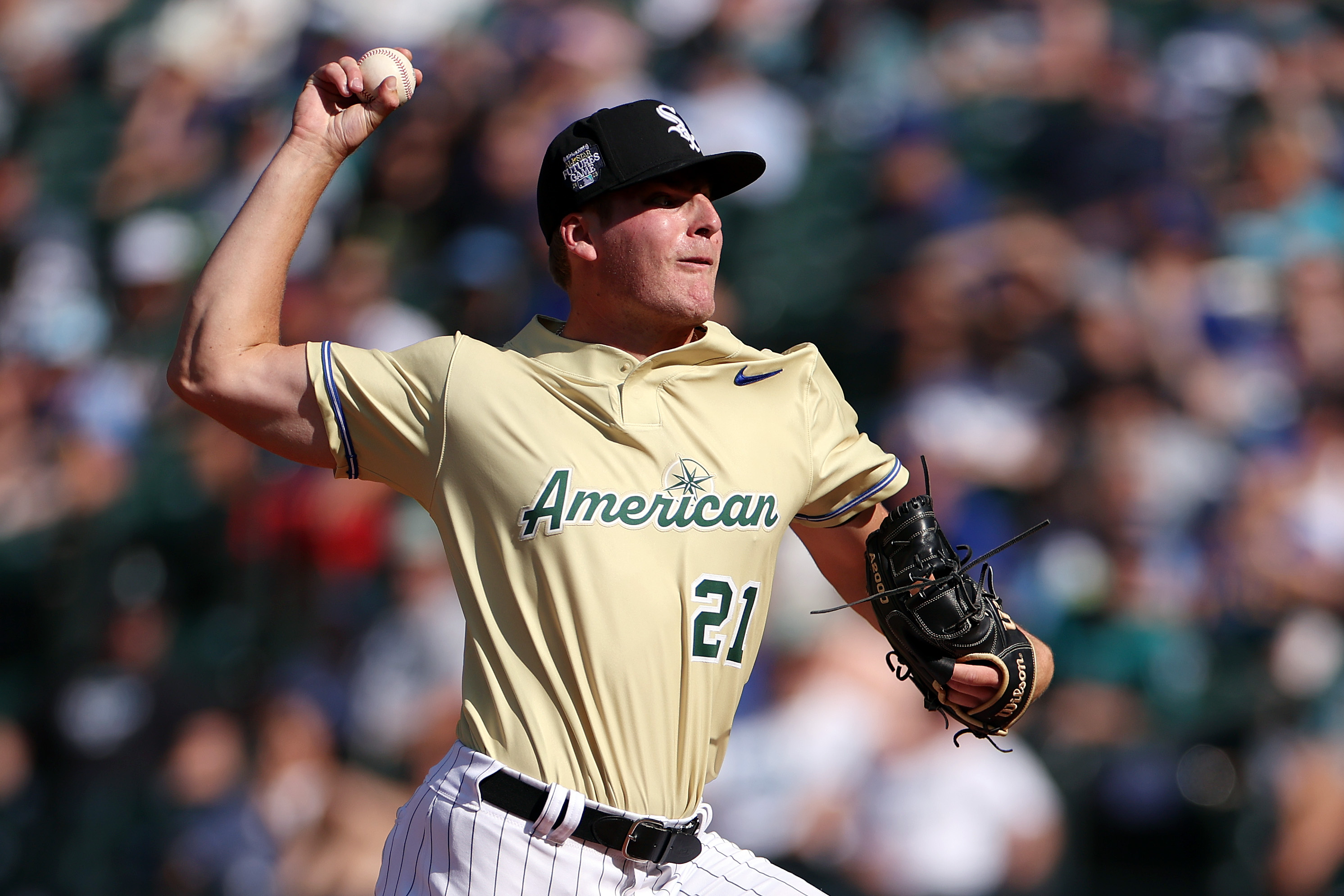Whether he qualifies as a visionary, at least give Anthony Rizzo credit for confidence and big talk.
“It’s totally different, especially for baseball players. Right now we would have been 3-0,” the Cubs’ first baseman said Monday. “We would have had a nice sweep on Sunday Night Baseball …”
That was Rizzo, at home in Florida, instead of in Chicago for what would have been the Cubs’ home opener, talking to our David Kaplan on ESPN 1000.
The three-time All-Star talked about everything from his foundation’s work getting meals to overburdened healthcare workers to his home workout schedule to his “awesome” dog Kevin — everything but playing the Pirates in the first scheduled home game of the 2020 season.
Definitely not the #OpeningDay I had imagined but let's all stick together (while practicing social distancing) and help one another. #OneTeam
Text Hope44 to 52000 or https://t.co/AfQLkHgb3o pic.twitter.com/8ByanCqTXQ
Rizzo said he and his family are healthy, and he still seems confident an abbreviated season will be played this year despite the unpredictability of the global COVID-19 pandemic that has shut down much of the country indefinitely, including organized sports.
But Monday’s place on the local baseball calendar served as just one more bittersweet reminder of some of the larger, harsh realities of this moment, especially in the trivial, escapist world of Cubs baseball and fandom.
MLB
And perhaps no Cub exemplifies that reminder of what this Cubs season promised — for better and for worse — than the club’s most tenured player, the face of the team.
This would have been Rizzo’s first game at Wrigley since his dramatically fast return from an ugly ankle injury to limp through that final home series of 2019, against the Cardinals, including a tying home run in his second at-bat.
“How many times have we had that opportunity for the division that late in the season?” he said of the incentive to return from that injury in September as spring training opened last month. “That’s what it’s all about.
“I don’t play fast anyway. I just played a little slower.”
During a time that suddenly has become much slower paced for both him and his team, Rizzo remains a centerpiece, a foundational piece, for the Cubs, even when it comes to community involvement during this crisis.
During a lengthy sit-down earlier this month, he talked about what that role means to him and where he and this team might go next.
* * *
Cubs president Theo Epstein called 2019 a “year of reckoning” for the Cubs and their championship core, but Rizzo and everyone in that clubhouse knew coming into spring training this season that 2020 was the moment of reckoning — whether anybody declared it or not.
A payroll budget squeeze created by luxury-tax considerations meant little help in the offseason and trade talks all winter. And even as the team returned to Arizona largely intact, it was clear that nothing was assured beyond the trade deadline, if that.
“We’ve got to enjoy these days. every single day,” Rizzo said. “Because, listen, it’s not Year Two for all of us; it’s coming toward the end for all of us [as a group].”
Rizzo, Kris Bryant, Javy Baez and Kyle Schwarber all are free agents at the end of 2021 — barring extension(s) that have proven difficult to impossible to get done. Willson Contreras, Albert Almora Jr. and Craig Kimbrel are eligible a year later.
Jose Quintana and Jon Lester could become free agents after 2020 (pending Lester’s club option).
“Realistically, we’re a bad start away from this team being blown up by the deadline,” Rizzo said. “We’re a good start away from adding onto a legacy.”
The coronovirus crisis has changed at least the math and timing since Rizzo talked about that. It’s unclear whether the same luxury tax issues will even apply to this season when it comes to the Cubs payroll — which might, in turn, impact decisions for 2021.
For Rizzo, the competitive urgency of the moment and team’s effort to plan for its next window meant an opportunity over the winter to approach Epstein about an extension for the player who went from face of the rebuild when acquired in 2012 to All-Star cornerstone as the team ascended to championship heights in 2016 to what he expects to be an evolving, growing leader in the clubhouse.
“It made a lot of sense to try to get it done and not try to break their bank and also be fair,” Rizzo said. “On the other side it didn’t make sense.”
Rizzo’s in the first of two option years of a team-friendly, seven-year. $41 million extension he signed during his first full season in 2013 — a deal that was criticized by many in the union, even as it has grown in value to nine years, $78 million (if the Cubs pick up the final, $16.5 million option for 2021).
With so much of the roster and plans in flux, coming off a missed postseason and managerial change, The Cubs shut down Rizzo’s overtures before talks could even begin.
It led Rizzo in January to call the business of baseball “as cutthroat as ever.”
“I’m going to enjoy this year as much as I can, because you just don’t know,” Rizzo said. “You have no idea. I want to stay [in Chicago]. I love this city; everyone knows how feel.”
You just don’t know. You have no idea.
He did not know how true that was, how quickly and significantly the world around him would change to prove it.
Major League Baseball shut down spring training camps and postponed the season two weeks later.
* * *
Rizzo is a cancer survivor who doesn’t talk much about it unless asked. But it informs much of his thinking and actions — whether his work with pediatric cancer research and treatment or his decision back in 2013 to accept what would become a far-below-market contract.
“That was a big [factor in the] decision on signing the early deal,” he said. “That financial stability. I never had money growing up. My parents spoiled my brother and I but they did it at a cost. And the security in outplaying the contract and everything that we hoped it would be happened.
“I want to continue to outplay it and really just be the best me I can be. And every year, I’ve learned more and more, and I’ve grown more and more.”
Rizzo, who was diagnosed not long after Epstein’s Red Sox drafted him in the sixth round in 2007, said he has no regrets about that contract now — even after three All-Star appearances, three Gold Gloves and two top-four MVP finishes.
“No, never.”
Really?
“No, I don’t,” he said. “I mean, I could be making a lot more money if I was a free agent, right?”
Or even just going through the arbitration process for three years.
“I’ve had the freedom from 22, 23 years old to financially do whatever I want and play freely,” he said. “And I’m going to be able to do financially whatever I want for the rest of my life as long as I don’t make poor choices.
“At the end of this contract, it’ll make a lot of money, and I’m playing the game I love.”
Someday he and the Cubs will return to that. The clouds of the moment will clear out for the summer escape of baseball again.
Even while still working in spring training, Rizzo seemed to keep a bigger picture in mind when talking about his own uncertain future — never mind the chaotic place we find ourselves in now.
“I’ve seen a lot. I’ve seen this whole operation grow,” he said, looking back on a Cubs career that started with the trade from San Diego for Andrew Cashner eight years ago. “And it’s like family. From walking into Wrigley Field to saying hello to the security guards and ushers, to my wife feeling comfortable, my parents feeling comfortable — all of it. That’s what makes it so great. That’s what makes it home to me.”
As Rizzo prepared for a pivotal point in his career, he promised even more at 30.
“I’m happy with the last five, six, seven years — my whole career,” he said. “But I really do believe I have way better years ahead of me.”
At 30 and 31 and 32?
“I feel like I’m 21 though,” he said. “Time flies by. That’s why you’re going to see me smiling, enjoying it, because it’s too short.”
Click here to download the new MyTeams App by NBC Sports! Receive comprehensive coverage of the Chicago Cubs easily on your device.

